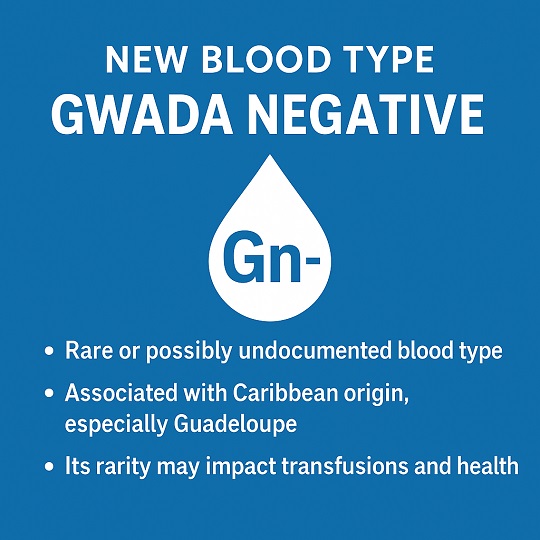
What Is Gwada Negative? Exploring the Mystery of the New Blood Type
What Is Gwada Negative? Exploring the Mystery of the New Blood Type. Discover everything about Gwada Negative — the mysterious new blood type gaining attention. Learn its origins, rarity, potential health impact, and scientific insights.
Introduction: The Buzz Around Gwada Negative
A surprising new term has entered medical and scientific discussions: Gwada Negative blood type. As researchers and health enthusiasts scramble for answers, this unusual blood type raises compelling questions. Is it real? Where did it originate? And what does it mean for medicine?
In this blog post, we dive deep into the Gwada Negative blood type — separating fact from speculation and analyzing the implications of this emerging topic.
What Is the Gwada Negative Blood Type?
The term “Gwada Negative” is not yet recognized in official medical literature or blood classification systems such as ABO and Rh (Rhesus) blood types. However, it’s believed to refer to a rare or possibly undocumented blood variant found predominantly among people of Caribbean origin, especially from Guadeloupe (nicknamed “Gwada”).
This has led some to speculate that Gwada Negative may be a unique antigen or rare Rh subtype, potentially impacting transfusion compatibility or immune responses.
The Science of Blood Types: A Quick Overview
Before we dig deeper, here’s a refresher:
- ABO System: Blood can be A, B, AB, or O, based on the presence of antigens.
- Rh Factor: Blood is either Rh-positive or Rh-negative depending on the D antigen.
- Rare Blood Types: Examples include Bombay phenotype and Rh-null, both extremely rare and region-specific.
So, where does Gwada Negative fit in? It may be a new designation for an unclassified or ultra-rare variant, similar in rarity to Rh-null (the “Golden Blood”), which only a few individuals worldwide have.
Is Gwada Negative Real or an Online Myth?
As of now, there’s no verified scientific publication confirming Gwada Negative as an official blood group. However, growing online conversations — particularly in Caribbean and African diaspora communities — suggest it may be a real, undocumented phenomenon or a regional naming convention for an ultra-rare Rh-negative subtype.
Keywords associated with this emerging trend:
- Rare blood types in the Caribbean
- New blood types discovered
- Gwada Negative Rh factor
- Rh-null blood group similarities
Why It Matters: Health Implications of Rare Blood Types
Rare blood types like Gwada Negative, if proven to exist, could have significant impacts:
- Transfusions: Patients may face serious challenges finding compatible donors.
- Pregnancy Risks: Rh incompatibility between mother and fetus could lead to complications.
- Scientific Insight: Discovering new blood groups helps us understand genetic diversity and evolution.
If you or someone you know has been told they have Gwada Negative blood, consult a hematologist or a specialized blood bank for advanced testing.
Gwada Negative and Genetics: Possible Explanations
Genetic researchers speculate that localized genetic mutations or ancestral links may explain unusual blood group variants in isolated populations — like islands in the Caribbean. This fits the theory behind Gwada Negative, suggesting a population-specific antigen expression.
Possible causes:
- Founder effect in island populations
- Undiscovered Rh antigen mutations
- Limited blood group screening in some regions
What to Do If You Have a Rare Blood Type
If you believe you have Gwada Negative or any rare blood type:
- Get genetically typed through a specialized lab.
- Join rare blood donor registries.
- Inform your healthcare providers and wear medical ID tags.
- Donate blood if you’re eligible — it could save lives.
Final Thoughts: The Future of Gwada Negative
While Gwada Negative blood type remains a medical mystery for now, growing interest and anecdotal evidence may soon prompt clinical studies and genetic investigations. Whether it’s a newly discovered antigen or a myth rooted in cultural language, it’s sparking important conversations about diversity in blood science.
Stay tuned as the world of hematology continues to evolve — one rare blood cell at a time.
References
- Daniels, G. (2013). Human Blood Groups (3rd ed.). Wiley-Blackwell.
https://doi.org/10.1002/9781118688975
Authoritative guide on all known human blood group systems. - Dean, L. (2005). Blood Groups and Red Cell Antigens. National Center for Biotechnology Information (NCBI).
https://www.ncbi.nlm.nih.gov/books/NBK2263/
Detailed overview of the ABO and Rh blood group systems. - International Society of Blood Transfusion (ISBT). (2024). Red Cell Immunogenetics and Blood Group Terminology.
https://www.isbtweb.org/isbt-working-parties/red-cell-immunogenetics-and-blood-group-terminology.html
Maintains official list of blood group systems and phenotypes. - Srivastava, P. R., & Wagner, F. F. (2019). Rh blood group system and the Rhnull phenotype. Transfusion Medicine Reviews, 33(1), 33–39.
https://doi.org/10.1016/j.tmrv.2018.08.001
Scientific discussion on rare Rh phenotypes including Rh-null. - Mollison, P. L., Engelfriet, C. P., & Contreras, M. (2013). Blood Transfusion in Clinical Medicine (12th ed.). Wiley-Blackwell.
Classic textbook in transfusion medicine and rare blood group management.
🌍 Global Blood Donation and Rare Blood Resources
- American Red Cross. (2024). Rare Blood Types.
https://www.redcrossblood.org/learn-about-blood/blood-types/rare-blood-types.html
Public resource explaining rare blood types and their impact. - World Health Organization (WHO). (2022). Blood Safety and Availability.
https://www.who.int/news-room/fact-sheets/detail/blood-safety-and-availability
WHO’s overview on blood safety, donor systems, and rare group challenges. - RARE Blood Donor Program – American Rare Donor Program (ARDP). (2023).
https://www.redcrossblood.org/donate-blood/manage-my-donations/rare-donor-program.html
Support system for individuals with uncommon or untyped blood groups.
🧬 Genetics and Anthropology of Blood
- Chalmers, J., & Boorman, K. E. (2001). Genetic variation in blood groups in island populations. Annals of Human Genetics, 65(3), 243–254.
https://doi.org/10.1046/j.1469-1809.2001.6530243.x
Study on blood group distribution among isolated island populations, relevant to Caribbean gene pools. - BBC Future. (2019). The world’s rarest blood type is Rh-null, known as “Golden Blood”.
https://www.bbc.com/future/article/20141119-the-worlds-rarest-blood-type
Accessible and popular science article on rare and ultra-rare blood types.


